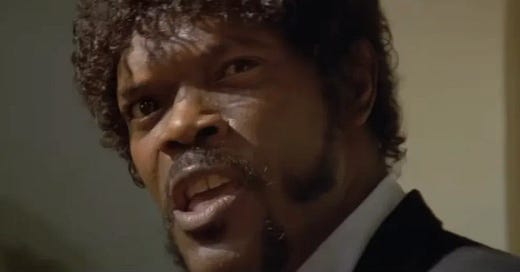Fake Film: Does AI have a Cinematic Future?
Great movie storytelling won't be enhanced by technical trickery.
What if I asked you to name a great movie you consider a work of art: Citizen Kane, Apocalypse Now, The Shawshank Redemption? I’d say Pulp Fiction is up there in the top ten. Every scene, every individual shot, every syllable of dialogue gives me something to enjoy and contemplate. With each re-watch, I discover new layers of meaning and awe-inspiring cinematic craftwork. The only use of VFX is some rear projection in the interior car scenes, as a nod to 1950s ambiance. Everything else relies on the skill of the actors, writers, and all the other human elements of production.
This is not to say that films or TV shows that use lots of VFX or CGI are not art. There are standouts in any genre, and I love a good superhero or scfi movie. If your character needs to fly or do battle with an alien monstrosity, some technological trickery is required. Digital production tools have been used for decades and continue to mature, but these are tools shaped by and used by human hands and eyes: they augment human abilities, they don’t replace them.
Generative AI has been steadily creeping into the film business, and many studios now leverage AI for things like voice dubbing, speeding up rotoscoping and other protracted techniques, and of course de-aging actors for those all-important flashback scenes. But lately, even more uses of AI have begun to proliferate. At the Zurich summit this year there was talk of the inevitable emergence, any day now, of an ‘AI Movie Star’.
Many in the movie business have chosen to embrace AI, while others consider it a threat to their craft and livelihood. It is telling that professionals at the top of the chain: Directors, producers, and film company execs, are more likely to be in favor of AI than those whose jobs are on the line: actors, art directors, sound engineers, photographers, etc. Earlier this year, the powers that be at Lionsgate thought it was a good idea to strike a deal with AI companies, but then announced voluntary layoffs soon after. Coincidence?
One brave and awesome stalwart on team human is actor and filmmaker Justine Bateman. After her experience on the WGA picket line in 2023 she formed a new council named Creedo23 which enables other filmmakers to sign a pledge that they will uphold the promise of “making very human, very raw, very real films/series, that respect the process of filmmaking” and display a badge of human authenticity. Here she is talking at the World Science Festival, where she described generative AI very aptly as “a blender that can produce nothing on its own”.
And that’s really the core problem: generative AI is being used to commoditize the works of other filmmakers, often without permission. It’s essentially a new kind of piracy that AI companies are attempting to legitimize.
They want us to believe we’re entering an era where movies will be entirely produced by machines. At the time of writing, there are more than sixty different AI video generators, including the much-hyped Sora (OpenAI), Veo (Google), Stable Video (Stability AI), Kling (Kuaishou), and Runway. Under the guise of ‘democratization of art’, the ultimate aim of these AI companies is to empower individuals or corporations to produce video without any human creators and at extremely low cost.
But the story of generative AI so far has been full of unmet expectations, so unsurprisingly, the hype around video generation has been overblown and in some cases quite misleading. What’s more, the computational costs of generating video are so high that AI companies are purposefully restricting movie clips to sixty seconds or less. There are reasons why every AI video clip you watch feels like you’re tripping on mushrooms.
If you work in the movie industry, we empathize with how you might be feeling at the moment. But keep your critical thinking hat on and know that much of what you see and hear right now is pure hype and reality distortion. There’s a chance that a lot of the worker doomsday scenarios won’t come to fruition. We certainly believe there’s a bright future ahead for all the talented and hard-working people behind the lights, cameras, and action!
I sincerely doubt that AI companies have any idea how to go from 30-second uncanny valley sequences of soundless, slow-motion animated gifs, to the genius moment created with the framing, lighting, voice intonation, and maleficent glare of Samuel L. Jackson’s eyes proclaiming: “And you will know my name is the Lord when I lay my vengeance upon thee.”









I think we might have some time before we need to worry about AI becoming an imposing force in the general cinematic domain. Horror, however? There AI might excel beyond humans have ever been able to. This reel will explain my point.
https://www.instagram.com/p/C-QvD5wN3Ex/